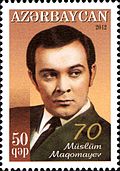Azerbaijani pop music
 From Wikipedia - Reading time: 10 min
From Wikipedia - Reading time: 10 min
| Azerbaijani pop music | |
|---|---|
| Stylistic origins | Traditional pop, Mugham, classical music, Europop |
| Cultural origins | 1950s, USSR |
 | ||||||
| Music of Azerbaijan | ||||||
| General topics | ||||||
|---|---|---|---|---|---|---|
| Genres | ||||||
| Specific forms | ||||||
|
||||||
| Media and performance | ||||||
|
||||||
| Nationalistic and patriotic songs | ||||||
|
Azerbaijani pop music (Azerbaijani: Azərbaycan pop musiqisi) is a pop music created in Azerbaijan. The emergence of Azerbaijani pop music dates back to the mid-20th century. Growth of new generation of musicians in the 1970s positively influenced Azerbaijan pop music's "golden age". Performers of traditional pop music such as Mirza Babayev, Flora Karimova and Shovkat Alakbarova achieved great success at that time. Contemporary Azerbaijani pop music has its roots in traditional Azerbaijani folk music.
As a result of globalisation, Azerbaijani pop music has been heavily influenced by both dance and electronic forms of pop music of the 1980s, as well as by genres of the 2000s such as electropop, dance-pop and synth-pop. In 2011, the song Running Scared (Ell & Nikki song), performed by the duo Ell & Nikki, was Azerbaijan's first-ever victory on European song contest Eurovision.
History
[edit]1960s
[edit]The early 1960s were probably the era when Azerbaijani pop music was most dependent on the group format, with pop acts, like rock bands, playing guitars and drums, with the occasional addition of keyboards or orchestration. Classical pop-folk music enjoyed mainstream popularity during this era, with artists such as Anatollu Ganiyev, Muslim Magomayev and Shahlar Guliyev.[1]
1970s
[edit]The Azerbaijani pop music experienced during the late 1970s a golden age of productivity characterized by the rise of a new generation of musicians. The classical pop artists such as Rashid Behbudov, Mirza Babayev, Flora Karimova, Shovkat Alakbarova, Ogtay Aghayev, and Gulagha Mammadov experienced their greatest success at the start of the decade and maintained their popularity throughout the entire music history.[2][3][4]
1980s
[edit]Akif Islamzade often considered one of the most successful and influential Azerbaijani male pop artists of the early 1980s.[5]
Baku chanson, a subgenre of Russian chanson, picked up popularity for the mid 1980s. Artists such as Eyyub Yaqubov brought Baku chanson to popularity in 1992.[6][7] However, many artists were uncomfortable with their success, and were equally suspicious of the chanson label.
1990s
[edit]In the early 1990s, the country music charts were dominated by pop singers with only tangential influences from regional music such as Niyameddin Musayev and Baloghlan Ashrafov, a trend that has continued since.[8]
In the 1990s, while the singles charts were dominated by boy bands and girl groups like Karvan and W Trio,[9] artists like Aygun Kazimova, Faig Aghayev, Samir Bagirov, Zulfiyya Khanbabayeva and Brilliant Dadasheva also enjoyed their greatest level of mainstream success to date, and the rise of World music helped revitalise the popularity of folk music.[10]
During first Nagorno-Karabakh War, in stark contrast to the upbeat dance based music of the scene was the emergence military bard that emerged as part of the independent or alternative folk scenes of the 1990s, following the lead of artists such as Shamistan Alizamanli and Mubariz Taghiyev.[11][12]
2000s
[edit]The Azerbaijani pop singer Röya breakthrough at the early 2000s led to her major international success in many Turkic speaking countries, especially the Iranian Azerbaijan and Turkey in addition to the music scene of Azerbaijan.[13][14]
At the beginning of the new millennium, while talent show contestants were one of the major forces in pop music, as country made its debut appearance at the 2008 Eurovision Song Contest. The country's entry gained the third place in 2009 and fifth the following year.[15] Ell and Nikki won the first place at the Eurovision Song Contest 2011 with the song "Running Scared", entitling Azerbaijan to host the contest in 2012, in Baku.[16][17]
On contrary, many music critics argued that the surge of Yeni Ulduz (Pop Idol) type competitions and reality shows on Azerbaijani TV has only added to the pop industry's shallow image, and is cited as the reason why underground and reactionary music is becoming more popular.[18][19]
2010s
[edit]Influenced by globalization of the world music, electropop, dance-pop, synthpop and electrohop, along with other forms of dance, electronica and pop music that started in the 1980s, have become the dominant form of music in the Azerbaijan in the early 2010s.
Despite the commercial dominance of hip-hop and pop during this period, rapper Miri Yusif found success with his reggae and soul fusion album "Karma", peaked at number 1 in the Azerbaijani Albums Chart in 2010.Also in 2018 the most viewed azerbaijani song belongs to Miri Yusif " Ad günü " (ft. Dilara Kazimova ) . Azerbaijan pop music industry keep growing up with Youtube mashups.[20][21][22]
Notable performers
[edit]Individuals
[edit]Female
[edit] |
 |
 | ||
| Sabina Babayeva · Safura Alizadeh · Flora Karimova | ||||
- Aygun Kazimova
- Tunzala Aghayeva
- Shovkat Alakbarova
- Sevda Alakbarzadeh
- Nushaba Alasgarly
- Safura Alizadeh
- Sheyla
- Sabina Babayeva
- Elnara
- Nazpari Dostaliyeva
- Khumar Gadimova
- Ilhama Gasimova
- Irada Ibrahimova
- Nigar Jamal
- Manana Japaridze
- Flora Karimova
- Konul Karimova
- Dilara Kazimova
- Zulfiyya Khanbabayeva
- Zeynab Khanlarova
- Aysel Teymurzadeh
- Röya
- Nahide Babashli
Male
[edit] |
 | |||
| Muslim Magomayev · Eldar Gasimov | ||||
- Emin Agalarov
- Aghadadash Aghayev
- Faig Aghayev
- Samir Bagirov
- Ogtay Aghayev
- Shamistan Alizamanli
- Mirza Babayev
- Abbas Baghirov
- Rashid Behbudov
- Bulbul
- Polad Bülbüloğlu
- Nadir Gafarzade
- Eldar Gasimov
- Talıb Tale
- Huseynagha Hadiyev
- Akif Islamzade
- Muslim Magomayev
- Farid Mammadov
- Adalet Shukurov
- Mubariz Taghiyev
- Eyyub Yaqubov
- Miri Yusif
- Elariz Mammadoğlu
Groups
[edit]See also
[edit]References
[edit]- ^ "Azərbaycanlı gizirə Xalq artisti adı verildi". anspress.com (in Azerbaijani). Archived from the original on 2014-06-27. Retrieved 28 June 2014.
- ^ "Oxumaq qarmon çalmaqdan çox-çox asandır..." www.anl.az (in Azerbaijani). Retrieved 26 June 2014.
- ^ Это мой мир, в котором я творю. vatan.etnosmi.ru (in Russian). Archived from the original on 4 March 2016. Retrieved 26 June 2014.
- ^ Дивный голос "Севгилим" из Южного Азербайджана. kultura.az (in Russian). Archived from the original on 3 July 2014. Retrieved 26 June 2014.
- ^ Акиф Исламзаде отметит день рождения во время ифтара. en.trend.az (in Russian). 8 August 2012. Retrieved 26 June 2014.
- ^ Valiyev, Suleyman (13 August 2007). Бакинский шансон умирает - певец Самед Самедов. www.trend.az (in Russian). Retrieved 26 June 2014.
- ^ БОКА: «ЕСЛИ БУДЕТ ПРЕДЛОЖЕНИЕ ИЗ БАКУ, ТО Я ЕГО ПРИМУ». vesti.az (in Russian). Archived from the original on 2014-08-10. Retrieved 26 June 2014.
- ^ ""Fəxri ad almaq üçün yuxarılara "xod" tapmaq lazımdır" EKSKLÜZİV". www.mediainfo.az (in Azerbaijani). Archived from the original on 7 September 2014. Retrieved 26 June 2014.
- ^ ""Karvan" qrupunun solisti: "Məni məcbur edirdi ki, başıma kitab qoyub nazikdaban tuflidə..." - EKSKLÜZİV". news.milli.az (in Azerbaijani). 14 March 2012. Retrieved 26 June 2014.
- ^ О нервных срывах, разводах и свадьбах. zerkalo.az (in Russian). Archived from the original on 2014-09-27. Retrieved 26 June 2014.
- ^ "Vətənpərvərlik mahnılarının təbliğatı və gənclərin milli mənlik şüuru..." www.anl.az (in Azerbaijani). Retrieved 28 June 2014.
- ^ ""Azərbaycan xalqına müraciət etmək istəyirəm"". www.diasporxeber.az (in Azerbaijani). Archived from the original on 4 March 2016. Retrieved 28 June 2014.
- ^ "The First Post: "Azeri sexy singer to save Iranian Azerbaijanis from fundamentalism"". www.today.az. Retrieved 28 June 2014.
- ^ "The Citizens of Azerbaijan Consider Mercedes, Röya, One Direction, Seron and FC Real Madrid as Being the Best Quality". www.newschannel6now.com. Archived from the original on 28 June 2014. Retrieved 28 June 2014.
- ^ Augstein, Frank. "Azerbaijan duo upset favorites Ireland for first-time win at 2011 Eurovision Song Contest". Daily Journal. Associated Press. Retrieved May 14, 2011.[permanent dead link]
- ^ "Azerbaijan wins the Eurovision Song Contest". BBC. May 14, 2011. Archived from the original on 14 May 2011. Retrieved May 14, 2011.
- ^ Lusher, Adam (May 15, 2011). "Azerbaijan wins Eurovision Song Contest". The Telegraph. London. Retrieved May 15, 2011.
- ^ Фаик Суджаддинов: Сегодняшнее состояние нашей эстрады - это позор!. azeri.ru (in Russian). Archived from the original on 2014-08-19. Retrieved 26 June 2014.
- ^ "Это уже не шоу-бизнес, а неприличная вульгарщина..." - известный телекритик Эльшад Гулиев о проблемах отечественной телеиндустрии. www.kavkaz-uzel.ru (in Russian). Retrieved 26 June 2014.
- ^ Vishnevsky, Felix. Мири Юсиф. Рождение "Белого ворона" - ФОТО. 1news.az (in Russian). Archived from the original on 16 June 2014. Retrieved 13 May 2014.
- ^ Акустический соло-концерт популярного исполнителя Мири Юсифа состоится 8 Марта. Zerkalo.az (in Russian). Archived from the original on 2014-09-27. Retrieved 26 June 2014.
- ^ Мири Юсиф собрал аншлаг в Зеленом Театре – ФОТО. 1news.az (in Russian). Archived from the original on 24 December 2014. Retrieved 26 June 2014.
 KSF
KSF